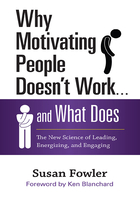
The heart of employee engagement
The appraisal process is at the heart of employee engagement—and disengagement. I would be surprised if your organization doesn't assess employee engagement or have some type of initiative aimed at improving it. Tons of data support the value of an engaged workforce. However, researchers have only recently explored how people come to be engaged.
I would be surprised if your organization doesn't assess employee engagement or have some type of initiative aimed at improving it. Tons of data support the value of an engaged workforce. However, researchers have only recently explored how people come to be engaged. How do you improve engagement scores if you don't understand the internal process individuals go through to become engaged?
How do you improve engagement scores if you don't understand the internal process individuals go through to become engaged?
You may find this encouraging: cutting-edge researchers discovered a higher level of engagement beyond the disengaged, actively disengaged, and engaged employee. They call it employee work passion. An individual with employee work passion demonstrates these five positive intentions:
• Performs above standard expectations
• Uses discretionary effort on behalf of the organization
• Endorses the organization and its leadership to others outside the organization
• Uses altruistic citizenship behaviors toward all stakeholders
• Stays with the organization
In these studies, researchers identified twelve organizational and job factors that influence a person's positive appraisal process. When the factors are in place, people are more likely to experience a positive sense of well-being that leads to positive intentions and behavior. Over time, they experience employee work passion.
When the factors are in place, people are more likely to experience a positive sense of well-being that leads to positive intentions and behavior. Over time, they experience employee work passion.
You can build an organization that supports employee work passion. You can change job designs, workload balance, distributive and procedural justice issues, and other systems and processes proven to encourage people's positive intentions. All of this is good news, but setting up new systems and processes takes time, and you need results now. What if you could help people manage their appraisal process today? You can.
This leads to a bold assertion: Motivating people may not work, but you can help facilitate people's appraisal process so they are more likely to experience day-to-day optimal motivation.
Optimal motivation means having the positive energy, vitality, and sense of well-being required to sustain the pursuit and achievement of meaningful goals while thriving and flourishing.
This leads to a second bold assertion: Motivation is a skill. People can learn to choose and create optimal motivational experiences anytime and anywhere.
Before you can help your people navigate their appraisal process or teach them the skill of motivation, you need to master it yourself—and that leads back to your meeting experience.